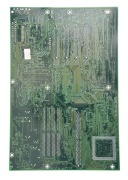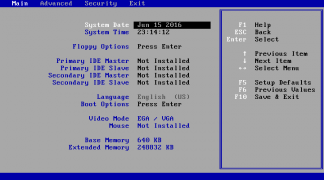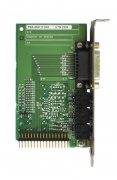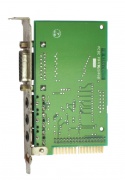Difference between revisions of "Intel Advanced/EV"
m (GL1zdA moved page Intel Advanced∕EV to Intel Advanced/EV: Changed "fraction sign" to slash.) |
m (Changed fraction sign to slash) |
||
| Line 73: | Line 73: | ||
}} | }} | ||
| − | The '''Intel | + | The '''Intel Advanced/EV''' (codename '''Endeavour''') is a Socket 5 Pentium 1 motherboard capable of up to 133MHz operation. It is also available in Socket 7 variants. |
The board has optional onboard audio (Creative Labs Vibra 16S/[[CT2504]]) with an YMF289(OPL3) and optional onboard video ([[S3 Trio64V+]]). Booting from CD is not possible without a third-party bootloader. | The board has optional onboard audio (Creative Labs Vibra 16S/[[CT2504]]) with an YMF289(OPL3) and optional onboard video ([[S3 Trio64V+]]). Booting from CD is not possible without a third-party bootloader. | ||
Revision as of 07:32, 3 December 2020
| Bus type | PCI | ||||||||||||||||
|---|---|---|---|---|---|---|---|---|---|---|---|---|---|---|---|---|---|
| Bus width | 32-bit | ||||||||||||||||
| Bus speed | 33 MHz | ||||||||||||||||
| PCI 5V tolerant? | Unknown"Unknown" is not recognized as a Boolean (true/false) value. | ||||||||||||||||
| PCI 3.3V tolerant? | Using "Is PCI 3.3V tolerant" as property chain is not permitted during the annotation process. | ||||||||||||||||
| Manufacturer | Intel | ||||||||||||||||
| Chipset | Intel 430FX | ||||||||||||||||
| Compatible with | IDE, PC Floppy, RS232, LPT, AT Keyboard | ||||||||||||||||
| Connectors | RS232/DB9, LPT, AT Keyboard | ||||||||||||||||
| Requires -5VDC? | Unknown"Unknown" is not recognized as a Boolean (true/false) value. | ||||||||||||||||
| Requires -12VDC? | Unknown"Unknown" is not recognized as a Boolean (true/false) value. | ||||||||||||||||
| Motherboard | |||||||||||||||||
| Form factor | Baby AT | ||||||||||||||||
| Power connector | |||||||||||||||||
| CPU socket | Socket 5 + COAST | ||||||||||||||||
| ISA slots | 3 @ 16-bit |
||||||||||||||||
| PCI slots | 4 @ 32-bit 33MHz |
||||||||||||||||
| RAM slots | 4 @ 72-pin |
||||||||||||||||
| Maximum RAM | 128MB134,217,728 B |
||||||||||||||||
| Boot ROM | Soldered, PLCC32, read-write | ||||||||||||||||
| IDE Controller | |||||||||||||||||
| IDE buses | 2 | ||||||||||||||||
| Primary? | Yes | ||||||||||||||||
| Secondary? | Yes | ||||||||||||||||
| Tertiary? | No | ||||||||||||||||
| Quaternary? | No | ||||||||||||||||
| ROM type | None | ||||||||||||||||
| Floppy Controller | |||||||||||||||||
| Floppy buses | 1 | ||||||||||||||||
| Drives per bus | 2 | ||||||||||||||||
| Secondary? | No | ||||||||||||||||
| ROM type | None | ||||||||||||||||
| Audio | |||||||||||||||||
| Model | CT2504 (Vibra 16S) | ||||||||||||||||
| Full duplex | Yes | ||||||||||||||||
| Max sample rate | Unknown | ||||||||||||||||
| Channels | 2 | ||||||||||||||||
| FM synth | OPL3 | ||||||||||||||||
| Internal connectors |
|
||||||||||||||||
| Factory memory | 0 MB0 B |
||||||||||||||||
| CD interface | None | ||||||||||||||||
| IO Controller | |||||||||||||||||
| Serial ports | 2 | ||||||||||||||||
| UART | |||||||||||||||||
| COM1/2/3/4? | Yes / Yes / Yes / Yes | ||||||||||||||||
| Parallel ports | 1 | ||||||||||||||||
| Bi-dir? | |||||||||||||||||
| ECP? | |||||||||||||||||
| EPP? | |||||||||||||||||
| LPT1/2/3/4? | Yes / ?"?" is not recognized as a Boolean (true/false) value. / No / No | ||||||||||||||||
| Game ports | 1 | ||||||||||||||||
| Manual | http://www.elhvb.com/mobokive/Archive/Intel/Advanced-EV_28183501.pdf | ||||||||||||||||
| Driver | Missing download URL | ||||||||||||||||
The Intel Advanced/EV (codename Endeavour) is a Socket 5 Pentium 1 motherboard capable of up to 133MHz operation. It is also available in Socket 7 variants.
The board has optional onboard audio (Creative Labs Vibra 16S/CT2504) with an YMF289(OPL3) and optional onboard video (S3 Trio64V+). Booting from CD is not possible without a third-party bootloader.
The board can be emulated in PCem.
Additional photos
Audio
The optional onboard audio is provided by a Creative Labs CT2504 Vibra 16S chip. While not plug-and-play, the BIOS allows the I/O resources to be configured as needed.
The rear plugs are provided by a custom riser board that occupies a rear slot. It does not obscure any ISA or PCI slots as none are present at that position. Some versions of the riser card have a connector for front panel audio, although it is unknown whether this matches the later standard pinout for front panel audio.
If no speakers are connected, the output of the sound card will automatically switch to the built-in PC speaker.
On-board OPL3
According to the Specification Update document from Intel, the onboard OPL3 can't be disabled.
MIDI Upgrade
The board has a connector for the optional MIDI upgrade. A SoundBlaster AWE32 Upgrade card (Goldfinch upgrade, CT1920/CT1922) can be used for this upgrade. The on-board Vibra doesn't decode the highest address bits, so you have to configure ports in a non-canonical way (for example 0x220 for the Vibra and 0x640 for the AWE32).
Power Management
The board provides very basic power management support: Hard drives and the video output can automatically be powered down after a configured time of inactivity.



